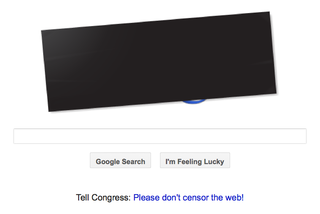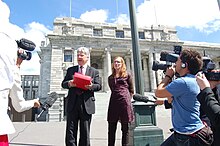Boing Boing is a website, first established as a zine in 1988, later becoming a group blog. Common topics and themes include technology, futurism, science fiction, gadgets, intellectual property, Disney, and left-wing politics. It twice won the Bloggies for Weblog of the Year, in 2004 and 2005. The editors are Mark Frauenfelder, David Pescovitz, Carla Sinclair, and Rob Beschizza, and the publisher is Jason Weisberger.

Judith Ngaire Tizard is a former New Zealand politician, and a member of the Labour Party.
Recorded Music NZ is a non-profit trade association of record producers, distributors and recording artists who sell recorded music in New Zealand. Membership of Recorded Music NZ is open to any owner of recorded music rights operating in New Zealand, inclusive of major labels, independent labels and self-released artists. Recorded Music NZ has over 2000 rights-holders.

Lixtor is an internet auction website operating in New Zealand since 2005, as a free alternative to Trade Me or Facebook Marketplace.

Melissa Ji-Yun Lee is a New Zealand politician. She was elected to the House of Representatives as a list MP for the National Party in the 2008 election. She currently serves as the 11th Minister for Economic Development, 28th Minister for Media and Communications and 2nd Minister for Ethnic Communities.

The Copyright Amendment Act 2008 was an act passed by the New Zealand Parliament amending the Copyright Act 1994. It received Royal Assent on 11 April 2008.
The copyright law of New Zealand is covered by the Copyright Act 1994 and subsequent amendments. It is administered by Business Law Policy Unit of the Ministry of Business, Innovation and Employment (MBIE). In June 2017, a review of the existing legislation was announced.

RiP!: A Remix Manifesto is a 2008 open-source documentary film about "the changing concept of copyright" directed by Brett Gaylor.
The French HADOPI law or Creation and Internet law was introduced during 2009, providing what is known as a graduated response as a means to encourage compliance with copyright laws. HADOPI is the acronym of the government agency created to administer it.

The Copyright Act 1994 is an Act of Parliament passed in New Zealand that, along with its various amendments, governs copyright in New Zealand. It is administered by Intellectual Property Policy Unit of the Ministry of Business, Innovation and Employment.

The Digital Economy Act 2010 is an Act of the Parliament of the United Kingdom. The act addresses media policy issues related to digital media, including copyright infringement, Internet domain names, Channel 4 media content, local radio and video games. Introduced to Parliament by Lord Mandelson on 20 November 2009, it received Royal Assent on 8 April 2010. It came into force two months later, with some exceptions: several sections – 5, 6, 7, 15, 16(1)and 30 to 32 – came into force immediately, whilst others required a statutory instrument before they would come into force. However some provisions have never come into force since the required statutory instruments were never passed by Parliament and considered to be "shelved" by 2014, and other sections were repealed.

The Copyright Amendment Act 2011 is an Act of the Parliament of New Zealand which amends the Copyright Act 1994.

The PROTECT IP Act was a proposed law with the stated goal of giving the US government and copyright holders additional tools to curb access to "rogue websites dedicated to the sale of infringing or counterfeit goods", especially those registered outside the U.S. The bill was introduced on May 12, 2011, by Senator Patrick Leahy (D-VT) and 11 bipartisan co-sponsors. The Congressional Budget Office estimated that implementation of the bill would cost the federal government $47 million through 2016, to cover enforcement costs and the hiring and training of 22 new special agents and 26 support staff. The Senate Judiciary Committee passed the bill, but Senator Ron Wyden (D-OR) placed a hold on it.

The Stop Online Piracy Act (SOPA) was a proposed United States congressional bill to expand the ability of U.S. law enforcement to combat online copyright infringement and online trafficking in counterfeit goods. Introduced on October 26, 2011, by Representative Lamar Smith (R-TX), provisions included the requesting of court orders to bar advertising networks and payment facilities from conducting business with infringing websites, and search engines from linking to the websites, and court orders requiring Internet service providers to block access to the websites. The proposed law would have expanded existing criminal laws to include unauthorized streaming of copyrighted content, imposing a maximum penalty of five years in prison.

On January 18, 2012, a series of coordinated protests occurred against two proposed laws in the United States Congress—the Stop Online Piracy Act (SOPA) and the PROTECT IP Act (PIPA). These followed smaller protests in late 2011. Protests were based on concerns that the bills, intended to provide more robust responses to copyright infringement arising outside the United States, contained measures that could possibly infringe online freedom of speech, websites, and Internet communities. Protesters also argued that there were insufficient safeguards in place to protect sites based upon user-generated content.
Copyright law of South Korea is regulated by the Copyright Act of 1957. It has been amended several times, with a recent 2009 revision introducing a three strikes policy for online copyright infringement.
The copyright law of Panama is primarily based on 1994 legislation, known as Law 15. The history of Panamanian intellectual property legislation dates to the 19th century. Only recently has copyright in Panama became seriously enforced, with past international criticism focusing on insufficient effort to enforce intellectual property laws. A new 2012 law has attracted concerns in the opposite direction, with many criticising it for being too draconian.

The Copyright Modernization Act, also known as Bill C-11, was introduced in the House of Commons of Canada on September 29, 2011 by Industry Minister Christian Paradis. It was virtually identical to the government's previous attempt to amend the Copyright Act, Bill C-32. Despite receiving unanimous opposition from all other parties, the Conservative Party of Canada was able to pass the bill due to their majority government. The bill received Royal Assent on June 29, 2012 becoming the first update to the Copyright Act since 1997.

Bronwyn Holloway-Smith is an artist and author from Wellington, New Zealand. She holds a PhD in Fine Arts from Massey University, and is Co-Director of Public Art Heritage Aotearoa New Zealand, a research initiative based at Massey University's Toi Rauwhārangi College of Creative Arts.
On July 10, 2012, the Russian Wikipedia blacked out in protest against the amendments to the law "On the Protection of Children from Information Harmful to their Health and Development" being considered in the Russian State Duma, as well as to draw public attention to Russian Internet Restriction Bill. On the day after the blackout, the title page of Russian Wikipedia displayed an information banner calling for opposition to the adoption of this bill.











